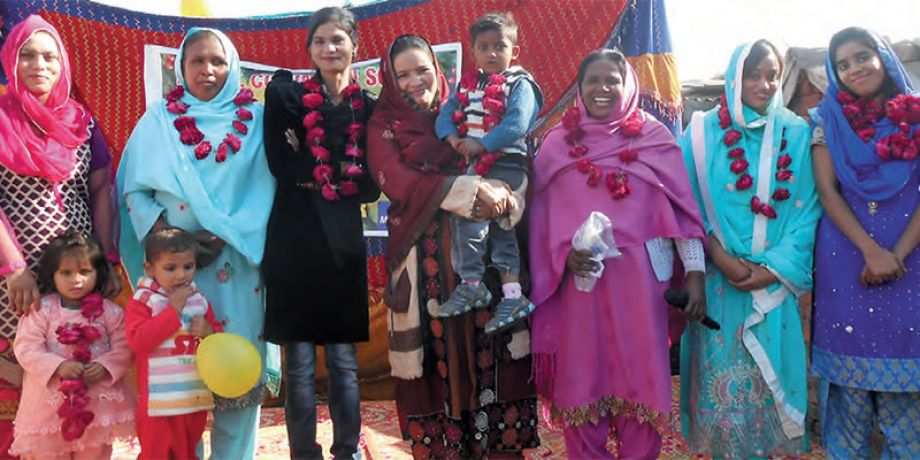
Educating Women And Children In Pakistan
Razia is a Pakistani woman of small stature and big heart. She has known the Columbans since about 1985, and from that time, has been involved in bringing education to the women and children of brick kiln workers in the villages around her home in Jiunpura, Sheikhupura, Punjab Province. This is her story in her own words.
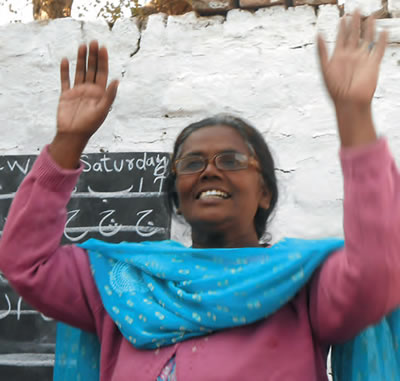
My name is Razia Barkat. I was born on the evening of December 12, 1965, in Hafizabad Parish, Punjab, about fifty kilometers from Sheikhupura. I was the youngest of ten children–five brothers and four sisters. All of my brothers died when they reached the age of five. Nobody really knows what kind of illness caused their deaths, but my family said it was panic (khauf). My birth brought no celebration or joy, but disappointment and sorrow. My parents wanted a boy. Everyone was weeping bitterly, and I was left all alone on the ground. My mother refused to touch me. However, after a while, my father lifted me up and hugged me. “She will be lucky” (qismat), he said, and told my eldest sister, Suraya, to clothe me well. My mother refused to feed me with her milk, so I was fed on buffalo milk all through my childhood, and I used to drink lots of it–about 2 liters a day.
When I was born, my family lived in a mud house, but soon afterwards they were able to build one of brick. I saw this as a sign of the blessing of my birth. At five years old I went to school. It was thought that there was no need to send me to be educated, as I would be married off. However, my father wanted me to go to school. There, I had a very good teacher named Miss Maya, and she found that I was very intelligent. I used to go to the Church twice a day, and also a Capuchin Brother would bring me to school. Even when I hurt my foot and could not walk, he carried me. I used to come first in the class, and I got many prizes.
When I reached fifth class, I was ready to go on to a government school, but my mother was a cleaner at a private school, and I was sent there. My father was a brick kiln worker, and he used to bring me to school on his way to work. In the evenings, he would take me on his lap and tell me stories about kings and queens, and I used to feel very peaceful. He always gave me great encouragement. He was a very good singer, and I too had this gift. I was more like him in many other ways too, even dark in color.
At the age of seventeen, a marriage was arranged for me with a man from Jiunpura, Sheikhupura. He was a brick kiln worker, an only son, illiterate, and very badly dressed. I had no desire to marry him, but his family insisted on the match, and my family hesitantly agreed.
My eldest sister Suraya, who used to look after our family while my mother was working, had gone to study nursing in Karachi. She became a staff nurse there, and my father wanted me to go and live with her. I didn’t want to leave my mother, but nevertheless, my father took me to Karachi, and to the hospital where my sister worked. He wanted me to stay on in the city with her and not return to be with my future husband. I was very happy to do so. However, one day, as I was traveling by bus to the hospital, a boy touched me. This frightened and disgusted me, and aIl I could do was cry. From that day I refused to go to the hospital any more.
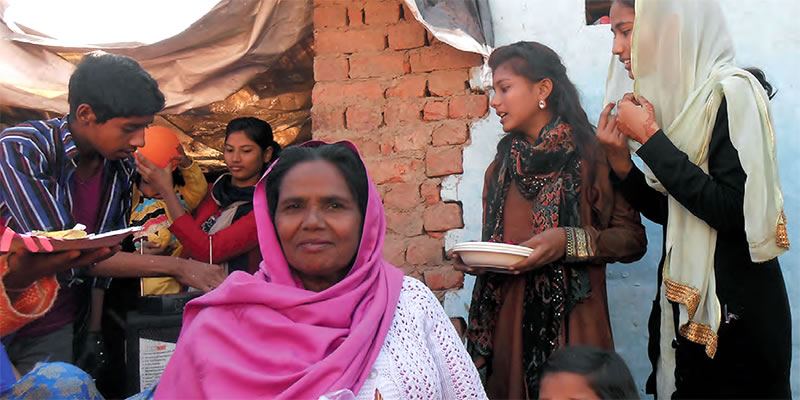
After a short time, I returned to Hafizabad, and there my future husband’s father showed me great affection, and used to bring me nice food every two weeks. Still, my mother did not want the marriage to take place, and offered him one of my sisters instead. However, he refused, and I was forced into the marriage. I still remember the date. It was November 20, 1982. I was seventeen, and he was about twenty-seven. People said the marriage would not last, and they shed many tears. I was given a buffalo and money, but still my tears flowed. My new husband’s family took away my dowry and jewelry, and I had no new clothes to wear. However, my sister-in-law gave me some of her jewelry.
I immediately conceived, and, exactly nine months later, had my first child, a healthy boy, whom I called Naveed. This made me very happy, because now I had someone to love. Two years later, I had another son, Vaheed, for whom my sister Suraya gave me lots of clothes.
Around this time, a big fight broke out with my in-laws, and I left Jiunpura and went home to Hafizabad. My husband came and took back the children, who were still on mother’s milk. My father sent him a message saying, “if you won’t let them return to be with their mother, then you might as well kill her.” After four days, Suraya came from Karachi, and my father told her to bring the children from Jiunpura. My father-in-law told my husband to let them go or I would die, and so he gave his consent. After that, I resolved that I would never again be separated from my children. When my husband came to visit, we had another fight, and I spent the whole night in the church.
Some time later, my daughter Sumera, whom I nicknamed Chanda (Moon), was born. She went to school in Hafizabad and was a very strong little girl. I worked at home in dressmaking, and my other sister Perveen, who lived in Faisalabad, about a hundred kilometers away, helped me a lot.
After a long time in Hafizabad, Babu Said (a catechist) came from Sheikhupura to visit me, and informed me that there was a course in adult literacy starting there, and that I should go for training. My husband gave his consent, and I returned to Jiunpura. That was how I began my career as a teacher.
Columban Fr. Tommy O’Hanlon (Fr. Tanveer) started me off with about twenty children between the ages of six and seven, and I was supervised by Master Lazar, a schoolteacher in the Sheikhupura area. With him and the support of Fr. Tanveer, I also opened five literacy centers, and was paid a monthly salary. I was very happy with this new development in my life.
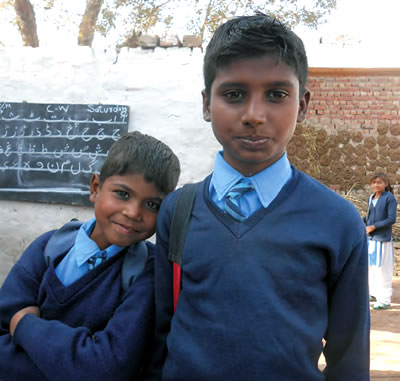 It was about this time that I met Columban Fr. Joe Joyce. One day he came to visit, and, because it was raining heavily, he told me that it would be better not to go out to check the schools. I was touched by his care for me.
It was about this time that I met Columban Fr. Joe Joyce. One day he came to visit, and, because it was raining heavily, he told me that it would be better not to go out to check the schools. I was touched by his care for me.
Some weeks later, another big rainstorm came, and there was flooding. Then, I got news that my son Vaheed, who was in Faisalabad, had died of dysentery. He was a very intelligent and loving child, and I nearly went insane with grief. I stopped eating, and wept continuously. Fr. Tanveer was very consoling, and I improved little by little, though I still continued to cry a lot at night.
When I got back my strength, I opened a nursery school in a brick kiln which was about two miles away from Jiunpura. I used to walk there every day until a man warned me of the danger I could be in because of being a young woman.
Then, another tragedy took place. My ten-year-old daughter Sumera got killed in a road accident. Once again, I was back in the depths of grief. After four months in this state, I had a dream in which my dead son Vaheed was calling me to be with him. I became very weak, and people were asking why, being such a good person, I had to suffer so much.
Little by little, I recovered. Fr. Tanveer and Columban Fr. Dan O’Connor gave me great support. One day Fr. Tanveer called me to the parish house, and when I entered his office, he closed the door, sat down, and asked me why I was not having any more children. I cried, and told him that I had had an operation. He prayed with me, and then arranged for me to go to a doctor in Faisalabad to see about having the operation reversed. However, the sister was no longer at the hospital, and I did not go again after that.
At this time a women’s group was being formed in the parish, and a Filipino Columban lay missionary, Miss Gloria Canama, invited me to attend a course with her in Multan. I took my youngest child, Jamshaed, with me because he was still being breast-fed. However, soon I had to send him back home because it was not possible to look after him and study as well.
Our women’s team was very good. We could share our sufferings and problems. In our monthly meetings, we used to choose a text from the Bible, usually about women, and try to apply it to our daily lives.
For three years–1989 to 1992– we worked in all of Sheikhupura. We had great affection for one another, and learned well together. One year, at Christmas time, we had a big celebration in Jiunpura on December 12. It was very cold, but 300 women attended. Gloria gave us great praise.
I used to go to the surrounding villages alone. On one occasion, I took a tonga, and the driver asked me what I was doing, and I said, “Teaching the women.” He replied angrily, “You are damaging our women.” I wasn’t afraid. I fought my corner with him and didn’t let his comment hinder my work.
Gloria gradually handed over more responsibility to me. She used to stay in our house, and taught me how to reflect more deeply on the Bible. We would go together to work with the women, and she was a great support to me.
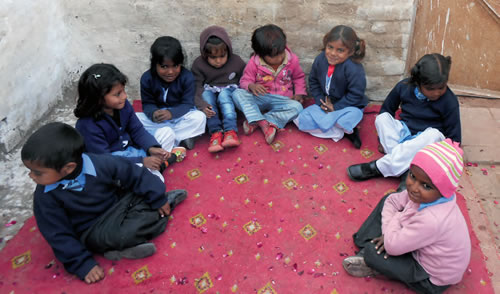 In 1999 the Columbans left the parish of Sheikhupura. This was a big blow for me, and I faced many troubles. I began to focus more on the people of my own neighborhood in Jiunpura where so many children were still in need of schooling.
In 1999 the Columbans left the parish of Sheikhupura. This was a big blow for me, and I faced many troubles. I began to focus more on the people of my own neighborhood in Jiunpura where so many children were still in need of schooling.
After about a year, one day a man named Rodney came to visit our house. He belonged to a group called The Pak-Swedish Foundation, and after we chatted for a while, he said, “You are very intelligent. Would you be willing to teach our brick kiln children?” I accepted, and he sent me to Lahore for eight days of training. I did well in the course, and in 2000 I opened a small school for 30 children and women in a nearby village named Kudlathi. I had to travel to work, and there were lots of obstacles to be overcome, but I persevered.
One day a shopkeeper got fresh with me, and I told him that I was a married woman, and he should not speak to me. He said, “Okay, it doesn’t matter,” and after that he didn’t bother me again. As time passed, the older men treated me and my family well, and I felt safe going about my work.
Each year there was an evaluation meeting of the Pak-Swedish schools in Lahore, and my school always came first. I got several awards from the Foundation, and I always remembered the Columbans with great gratitude, especially Miss Gloria, Fr. Tanveer, Fr. Joe, and Fr. Dan.
On one special occasion, it was announced that there would be an inter-school competition, and a special prize would be given to the winning school. Ten schools participated, and mine came first with the highest marks, and I was awarded some cash.
I always worked hard and well, and I knew that God was with me. I was given 130 children to teach, and I found it to be very fruitful. One year, when the fifth class students were to take government exams, I prepared them myself, and, after sitting for 10 papers each day during three days, they all passed. That was a great boost for me.
The Pak-Swedish schools closed in 2010. After that, I continued to teach for a while. However, the expenses became too much for me. Then, in 2013, I talked with Fr. Joe Joyce and explained the situation to him. He agreed to give me financial support, and I was able to supply uniforms, books, bags, and even some simple furniture, like desks. Soon, I was even able to employ some extra teachers, and now, with the ongoing support of the Columbans, I have been able to provide basic education for hundreds of children. I remain most grateful to the Columbans for all they have done for me, and through me, for my own people. May God bless them all.
Columban Fr. Joseph Joyce lives and works in Pakistan; Razia continues to teach.